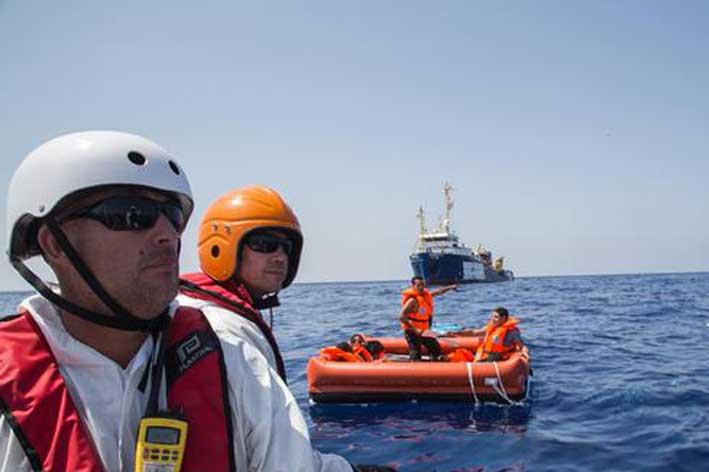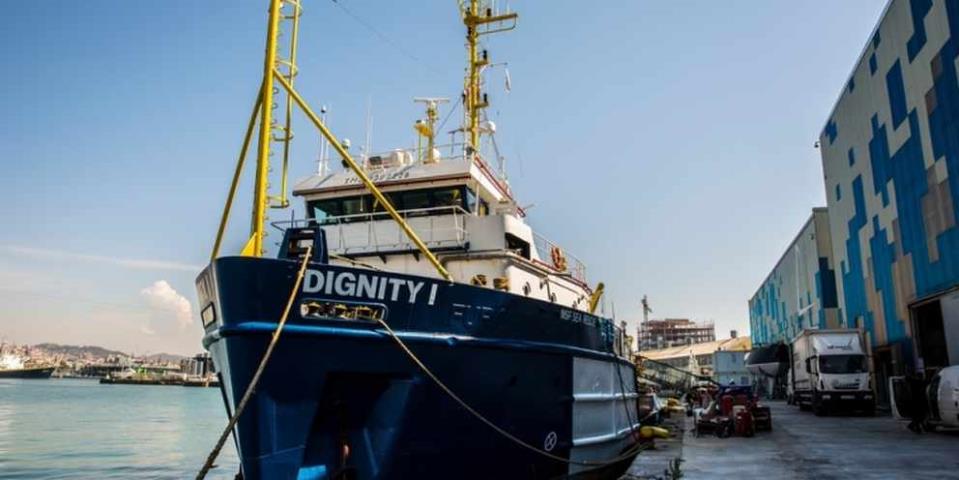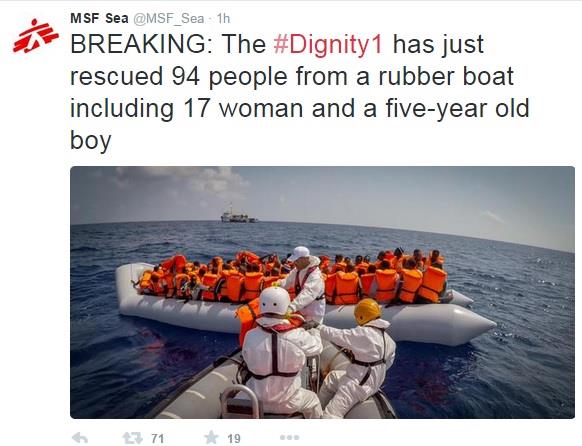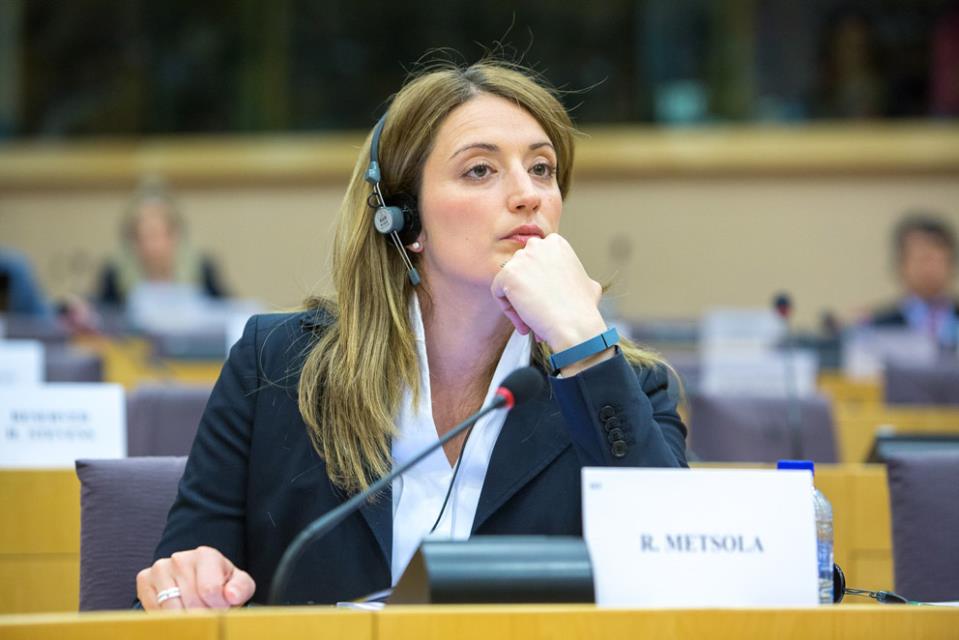A fishing boat crowded with migrants overturned Wednesday in the Mediterranean off Libya as rescuers approached, and the Italian coast guard and Irish navy said at least 367 people were saved, although 25 bodies also were found in the latest human smuggling tragedy.
Coast guard Cmdr. Filippo Marini said the rescue operation, involving seven ships, was still underway several hours after the capsizing. Survivors indicated that between 400 and 600 people were aboard the smugglers' boat, he added.
The exact number of those aboard might never be known, but authorities hoped to have a better idea after survivors are interviewed.

Photo tweeted by MSF shows some of the survivors of today's shipwreck on a life-raft. Photo: Marta Sozyinska/MSF
The Irish naval vessel Le Niamh was one of the ships tasked by the coast guard to speed to the rescue of the boat shortly before noon, Irish Capt. Donal Gallagher told The Associated Press by phone.
The Le Niamh arrived near the fishing boat, Marini said, and "at the sight of it, the migrants shifted" to one side and their boat capsized.
An Irish Defense Forces statement said that when it reached the scene, the Le Niamh deployed two rigid hull inflatable boats on either side of the vessel "as per standard procedure. However, the vessel capsized." The Le Niamh deployed life rafts and other rigid hulled boats, it added.

An Italian military helicopter dropped additional life rafts into the sea, where 150 people were initially spotted, Gallagher said.
By evening, the Le Niamh had 367 people aboard, including 13 children, the Irish military said.
Since the water was warm, rescuers worked with hope of finding more survivors, even as dusk approached. The vessel was reported to be 110 kilometers (about 75 miles) northwest of Tripoli, Libya's capital.
In April, a crammed fishing boat sank, taking down with it perhaps as many as 800 migrants trapped inside the hold. Only 28 people, including two alleged smugglers, survived.

Prosecutors in Sicily said smugglers routinely pack unseaworthy boats far past capacity, with hundreds of migrants below deck. Italian navy divers determined that hundreds of migrants were trapped inside the boat when it sank. That boat overturned when a container ship went to its rescue, the smugglers botched the steering, and migrants also rushed to one side, investigators determined.
If it is determined that hundreds were crammed in the hold of the iron fishing boat that overturned Wednesday, there is a real risk that many of the migrants died trapped inside, said Flavio Di Giacomo of the International Organization for Migration, a human rights group.
Di Giacomo said the estimate of 600 aboard was credible because the boat was 20-25 meters (70-85 feet) long, and smugglers, who don't like to leave any space unused, usually fit about 600 aboard a fishing boat of that size.
Also involved in Wednesday's rescue were an Italian vessel and a boat operated by Doctors Without Borders.
Non-governmental organizations or cargo ships in the vicinity frequently help rescue migrants, with operations coordinated by Italy's coast guard and under the umbrella of a European Union task force known as Triton.
On Tuesday, the International Organization for Migration said nearly 2,000 migrants are believed to have died at sea since the start of this year, but the exact toll isn't known.
Fleeing war, persecution and poverty, the migrants travel overland for weeks or months from sub-Saharan Africa, the Horn of Africa, the Middle East and parts of Asia to reach Libya. Once there, they set sail in flimsy motorized rubber dinghies or rickety fishing boats. When the vessels have problems, often someone aboard contacts the coast guard by satellite phone to request rescue. Other boats in distress are spotted by Triton air surveillance.
Most of the migrants hope to find asylum, relatives or jobs, mainly in northern Europe.
In a commentary, Amnesty International said:
European governments must do more to provide safe and legal ways for people in need of protection to enter the European Union (EU), rather than risking their lives at sea in their thousands, Amnesty International said as a massive search and rescue operation got underway in the central Mediterranean earlier today.
Media reports say hundreds of people are feared lost at sea after a fishing boat, which carried an estimated 600 people, capsized off the Libyan port of Zuwara. More than 400 people have been rescued and 25 bodies were retrieved so far. Rescue operations, carried out with the participation of vessels from various countries as well as NGOs Médecins Sans Frontières (MSF) ýand Migrant Offshore Aid Station (MOAS), are ongoing and will continue overnight.
“People are still crossing the central Mediterranean in their thousands almost every week to seek safety and better lives in Europe, so fatal incidents at sea are going to remain a tragic reality,” said Denis Krivosheev, Deputy Europe and Central Asia Director at Amnesty International.
“Today’s fatal incident emphasizes how European governments must immediately put in place safe and legal routes for those in need of protection to reduce the numbers of people embarking on perilous sea journeys.”
It is the first incident of this scale since EU governments agreed to scale up search and rescue operations in late April, which curtailed an unprecedented surge in deaths at sea in the early months of 2015.
Amnesty International is calling for increased pledges to resettle refugees, expanded access to Europe through humanitarian visas and family reunification, and an easing of restrictions on freedom of movement of successful asylum seekers.
“As long as refugees and migrants only have access to Europe through dangerous journeys, it is imperative that efforts to save lives at sea are given top priority. Humanitarian operations launched by European governments in the aftermath of the April shipwrecks, when more than 1,200 people died or disappeared at sea, must continue to be properly resourced and implemented,” said Denis Krivosheev.
Today’s incident comes a day after the International Organization for Migration announced that 2,000 migrants and asylum-seekers had already perished in the Mediterranean this year. Around 98,000 refugees and migrants crossed the central Mediterranean and arrived to Italy so far this year
MEP Roberta Metsola says seismic shift in our thinking needed in order to address migration
In comments to this newsroom, MEP Roberta Metsola, who is the European Parliament's rapporteur on a bi-partisan migration report, said: “Today looks likely to be yet another fatal day in the Mediterranean.
“My thoughts are with the ever growing numbers of nameless women, men and children who, in their last moments could only look as far ahead as the next wave. Their dreams of a future without fear and a semblance of the normality which we take so much for granted, drown with them.

“Once again human lives have been cruelly cut short in our sea, once a symbol of hope, but now a cemetery of broken lives and a cenotaph to broken promises.
“If not for the heroic efforts of rescuers in the vicinity, including NGO ships, different navy vessels and merchant shipping, the death toll would have been much higher.
“Each tragedy is followed by promise after promise that action will be taken to prevent such horrific loss of human life. The time for small steps has long been over. We need a seismic shift in our thinking in order to address migration in a human and humane way.
“A holistic approach to this ongoing tragedy is required, spanning from the means to tackle criminal networks trading in human lives; to helping countries in the region, particularly Libya and countries of origin, get back on their feet; to pushing EU Prime Ministers to find the courage to share the responsibility among all States; to establishing safe routes for those in need of protection; to safely returning those who are not eligible for protection.
“Migration is the challenge of our generation, we cannot come up short.”